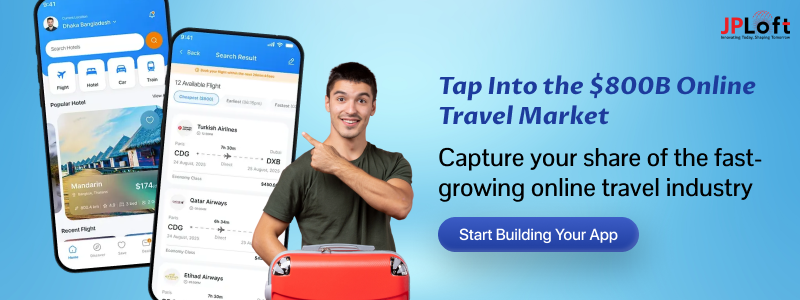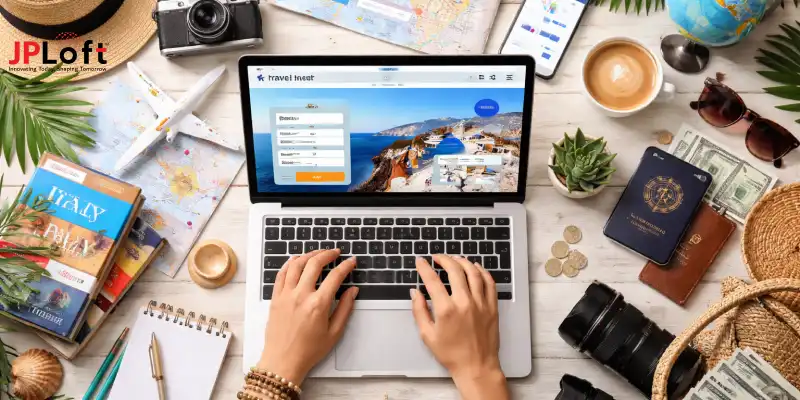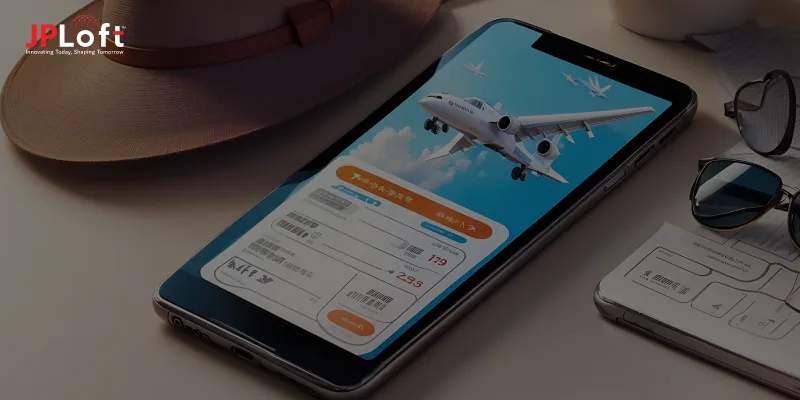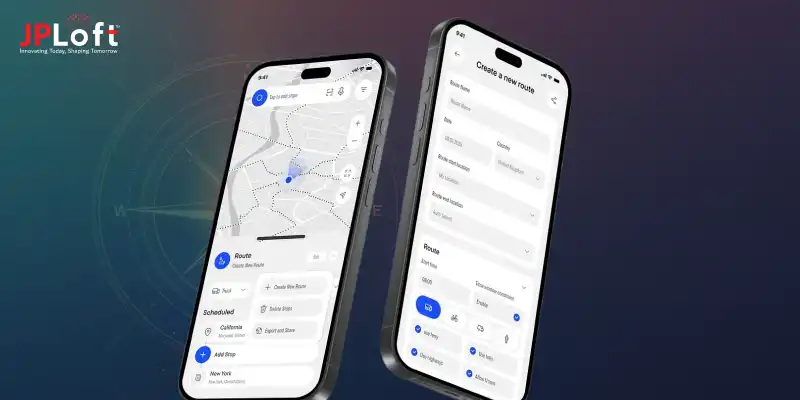Key Takeaways
Build a hotel booking app like Booking.com in 2026; it requires strong personalization, high performance, and airtight security to meet rising traveler expectations.
AI, ML, and automation will shape the next generation of travel apps with predictive recommendations, dynamic pricing, and frictionless booking flows.
Understanding how to create a hotel booking app like Booking.com means combining real-time inventory syncing, scalable architecture, and a clean, conversion-focused UX.
Monetization thrives on scalable models like commissions, premium placements, and strategic partnerships that ensure sustainable revenue.
Partnering with a trusted tech team like JPLoft ensures your platform is built with modern architecture, advanced features, and long-term global scalability.
The way travelers search, compare, and book stays has changed dramatically over the past decade, and platforms like Booking.com have played a major role in that evolution.
With its smooth user experience, vast accommodation inventory, and trusted booking flow, it has become the benchmark for businesses planning their own hotel booking platform.
Many brands today are asking: how to develop a hotel Booking.com app?
The answer lies in combining smart UX design, real-time inventory syncing, secure payments, and scalable architecture tailored for modern travel behavior.
As mobile travel bookings surge and users expect fast searches, reliable reviews, and instant confirmations, more companies are exploring what it takes to build a hotel booking app like Booking.com and compete in this fast-growing market.
Whether you're upgrading a traditional travel business or launching a new digital platform, understanding the Booking.com framework will help you create an app that stands out in 2026 and beyond.
An Overview of Booking.com
Booking.com is one of the world’s most influential online travel platforms, known for helping millions of users find and book accommodations with ease. Founded in 1996 in Amsterdam, it has grown from a small startup into a global leader offering hotels, resorts, apartments, villas, hostels, and unique stays across 200+ countries.
Its strength lies in an easy booking flow, transparent pricing, trustworthy reviews, and an enormous property inventory that appeals to every type of traveler.
Here are some strong data insights highlighting Booking.com’s scale:
-
Booking Holdings reported $166 billion in gross travel bookings in 2024, marking ~10% year-over-year growth.
-
Over 1.1 billion room nights were booked globally, showing sustained demand.
-
The platform lists more than 3.4 million properties, including 475,000 hotels and resorts.
-
Booking.com supports 40+ languages and serves users in over 220 countries and territories.
These numbers explain why many businesses study Booking.com’s model while estimating the cost to develop a travel app that can compete in today’s digital travel landscape. The platform has set new standards for convenience, trust, and personalization, all essential for building a successful hotel booking solution.
Its proven business model also helps founders understand how to create a travel app that aligns with modern traveler expectations, from intuitive search to cancellation flexibility and personalized recommendations.
Whether you plan to build a niche hotel booking platform or a full OTA, understanding Booking.com’s strengths offers clarity on what features, systems, and user workflows matter most.
How Does a Hotel Booking App Like Booking.com Work?
A hotel booking app like Booking.com operates through a mix of real-time data, intuitive UI, strong backend systems, and automated workflows that help users find the right stay quickly and confidently.
Here’s a breakdown of how the entire process works:
1. User Search & Discovery
Users start by entering their destination, travel dates, group size, and filters such as budget, amenities, and property type. The app’s search engine processes the request instantly and fetches relevant accommodation options.
At this stage, many modern platforms experiment with AR in travel apps to enhance discovery by offering 3D views, interactive room previews, or neighborhood explorations before booking.
2. Real-Time Inventory Management
Booking apps connect with hotels through channel managers, PMS systems, and APIs to sync room availability and pricing.
This ensures users always see accurate data, a crucial factor for trust. The algorithm also prioritizes listings based on relevance, ratings, and user preferences.
3. Smart Recommendations & Personalization
Based on user history, behavior, budget, and travel patterns, the app generates personalized suggestions.
With the rise of AI in hospitality, platforms now use machine learning models to offer dynamic pricing, tailored deals, and hyper-personalized stay recommendations that improve conversions significantly.
4. Detailed Listings & Guest Reviews
Each property page includes room details, amenities, photos, policies, maps, and verified reviews.
These elements help travelers make informed decisions. Many successful platforms often compare themselves to the best travel apps, ensuring transparency, easy navigation, and rich content quality that keeps users engaged.
5. Secure Booking & Payment Flow
Once a traveler selects a property, the app enables a seamless booking flow: room selection, guest details, add-ons, and secure payment processing.
Features like wallet integration, one-tap checkout, multiple currencies, and instant confirmation make the experience smooth and reliable.
6. AI-Powered Post-Booking Assistance
Modern booking apps increasingly focus on improving post-booking engagement with chatbots, virtual assistants, and personalized itineraries.
Understanding how to build an AI travel agent becomes valuable here, as AI-driven helpers can guide users with reminders, check-in instructions, travel tips, and local suggestions, enhancing the overall customer experience.
Why Create an App Like Booking.com in 2026?
Create an app like Booking.com in 2026 and it will give businesses a competitive gateway into a fast-evolving travel market where users expect personalization, instant bookings, and intuitive navigation.
With digital transformation accelerating across tourism, now is the ideal moment to build a platform that leverages AI, automation, and mobile-first behavior.
► Travel Demand Is Surging Again
Global tourism continues to rise, and travelers increasingly rely on digital platforms for simplified planning, price comparisons, and personalized stay recommendations.
With travel app development trends becoming more AI-centric, businesses can deliver smarter booking workflows and tailored suggestions that boost engagement and conversions.
► Higher Revenue Opportunities Through Direct Bookings
If businesses create an app like Booking.com, they can move beyond aggregator dependency and unlock revenue via direct hotel tie-ups, exclusive deals, premium placements, and dynamic pricing.
For innovators wanting deeper personalization, knowledge about building an AI trip planner app can further enhance user experience while opening new monetization layers.
► AI & Automation are Reshaping Traveler Expectations
From predictive pricing engines to sentiment-driven filters, AI, ML, and NLP are making travel apps smarter than ever. But as booking platforms handle sensitive data, preferences, IDs, and payment info, developers must prioritize secure architectures.
This is where strong travel app security becomes essential for ensuring trust and compliance across borders.
► Mobile-First Travel Planning Is Becoming the Norm
More than 70% of modern travelers book hotels, flights, and activities directly on their phones.
This shift encourages brands to explore top travel app ideas that combine convenience, personalization, and real-time insights, making their platform stand out in a highly competitive marketplace.
Features to Include in an App Like Booking.com
Creating a Booking.com-style hotel app requires a robust blend of usability, automation, personalization, and secure booking workflows.
To stay competitive in the market, your platform must incorporate top travel app features that enhance convenience, speed, and trust.
Below are the must-have elements you need to build a scalable and high-performing hotel booking app.
1. Intelligent Search & Advanced Filters
Deliver fast, precise results with filters for price, amenities, ratings, property type, location, and availability. A powerful search system ensures users can quickly find the right stay, improving overall satisfaction and boosting booking conversions.
2. High-Quality Property Profiles
Showcase hotels with HD images, room types, amenities, policies, maps, and guest ratings. Transparency builds trust and boosts conversions.
3. Real-Time Availability & Pricing Updates
Integrate property management systems to sync inventory and pricing automatically. This prevents overbookings and delivers accurate live data.
4. Reviews, Ratings & Sentiment Summaries
User-generated reviews and NLP-driven sentiment highlights add credibility and help travelers make informed decisions quickly.
5. Secure Multi-Method Payment Gateway
Offer multiple payment options: cards, UPI, wallets, BNPL, and international methods, secured with PCI-DSS compliance and fraud detection.
6. Smart Recommendations Using AI
Use AI/ML to suggest hotels based on user behavior, preferences, budget, and historical booking patterns for hyper-personalization.
7. Booking Management Dashboard
Allow users to modify, cancel, or rebook stays within seconds. Automated notifications keep them updated about changes or confirmations.
8. Wishlists & Save-for-Later Functionality
Help users curate their favorite hotels, compare them, or revisit them when ready to book, boosting retention and repeat visits.
9. In-App Chat Support & AI Chatbots
AI-powered chatbots offer 24/7 assistance for booking queries, cancellations, travel details, and issue resolution without human delay.
10. Multi-Language & Multi-Currency Support
Enable global usability with automatic currency conversion, localized pricing, and language preferences for travelers worldwide.
11. Maps Integration & Nearby Recommendations
Integrate Google Maps or Mapbox to show nearby attractions, transit options, walkability scores, and exact hotel coordinates.
12. Loyalty Programs & Rewards Integration
Offer redeemable points, tier-based rewards, discounts, and personalized perks to encourage long-term user engagement.
13. Personalized Deals & Dynamic Pricing
Trigger smart discounts based on demand, booking windows, user location, or loyalty history using data-driven pricing engines.
14. Push Notifications & Real-Time Alerts
Send alerts for price drops, booking confirmations, exclusive deals, and trip reminders to drive engagement and conversions.
15. Fraud Prevention & Account Security
Ensure data security with MFA, biometric login, end-to-end encryption, and suspicious activity monitoring to protect user information.
Feature Summary Table
|
Feature Name |
Purpose / Value |
|
Intelligent Search & Filters |
Improves discovery and booking precision |
|
High-Quality Property Profiles |
Boosts trust and transparency |
|
Real-Time Availability |
Prevents overbookings and errors |
|
Reviews & Ratings |
Builds social proof and confidence |
|
Secure Payments |
Ensures safe and seamless transactions |
|
AI Recommendations |
Personalizes user journeys |
|
Booking Management |
Gives users full control over bookings |
|
Wishlists |
Encourages retention and revisit behavior |
|
In-App Chat & AI Chatbot |
Provides instant assistance |
|
Multi-Language & Currency |
Enables global usability |
|
Maps Integration |
Enhances local navigation and decision-making |
|
Loyalty & Rewards |
Drives repeat bookings |
|
Personalized Deals |
Maximizes conversions with smart pricing |
|
Push Notifications |
Improves engagement and reactivation |
|
Fraud Prevention |
Protects accounts and user trust |
Steps to Develop an App Like Booking.com
Building a world-class hotel booking platform like Booking.com requires a structured combination of user research, intelligent UX planning, the right development methodology, and a scalable technical foundation.
Below is a deeply expanded process that helps you understand how to build a hotel booking app that is not only feature-rich but optimized for conversions, speed, and global usability.
Step 1: Conduct Market Research & Define Scope
Your journey begins with understanding user expectations, traveler behavior, and the competitive landscape. Analyze top platforms like Booking.com, Agoda, Expedia, and niche travel apps to uncover gaps and opportunities.
Identify what your target users value most, price accuracy, property photos, simple search, map-based discovery, or reward systems. This clarity helps you define a sharp scope and prevents feature bloat later.
Successful teams use this stage to validate monetization models, pricing strategies, and USPs before a single screen is designed.
Step 2: Create User Journeys & UX Blueprints
This step focuses on plotting seamless user journeys across every touchpoint—searching hotels, filtering results, reading reviews, making payments, and managing bookings.
Understanding how to design a travel app is critical here, ensuring intuitive navigation, quick comparison tools, visually appealing listings, clear icons, and frictionless checkout flows.
Wireframes, high-fidelity prototypes, and early usability testing give you a realistic idea of how your interface should look, feel, and behave before development begins, saving time and cost later.
Step 3: Choose the Architecture & Travel App Tech Stack
This is where technical planning meets strategic decision-making. Selecting the right travel app tech stack determines your app’s performance, security, and ability to scale.
Your backend should support millions of request calls for availability checks, AI-driven suggestions, dynamic pricing, secure payments, and wishlist syncing.
Choose robust databases, caching layers, load balancers, and cloud hosting solutions. Consider technologies that support microservices, real-time updates, CDN optimization, and global content delivery.
A scalable architecture reduces downtime and ensures the app can grow into a multi-vertical travel ecosystem.
Step 4: Develop Core Booking Features
Begin developing the essential components:
-
Intelligent search & filtering
-
High-quality hotel profiles
-
Real-time availability updates
-
Booking engine with cancellation rules
-
Secure payment gateway
-
Reviews and ratings
-
Wishlists and loyalty modules
-
Multi-currency and multi-language support
-
Personalized deals based on AI signals
Each feature must contribute to a smooth, reliable booking experience that mirrors the ease of Booking.com, fast, accurate, and user-friendly.
Step 5: Integrate Third-Party Systems & APIs
This step determines how efficiently your app connects to real-world hotel inventory. PMS and OTA integrations synchronize availability, pricing, and property updates in real time.
You also integrate:
-
Maps and geolocation APIs
-
Payment processors
-
Fraud detection systems
-
Chatbots and NLP assistants
-
AI recommendation engines
-
Cloud-based inventory syncing tools
This is one of the most essential steps in understanding how to develop an app like Booking.com, ensuring a global inventory without manual intervention.
Step 6: Build the Admin Panel & Hotel Partner Dashboard
A hotel booking platform is incomplete without tools for property managers.
The partner dashboard enables:
-
Listing management
-
Adding or updating room details
-
Managing pricing and inventory
-
Viewing bookings, cancellations & analytics
Your internal admin panel should also support promotions, user accounts, refunds, cancellations, and app-wide data monitoring.
Step 7: Perform Rigorous Travel App Testing
Testing determines the reliability and trustworthiness of your platform. With comprehensive travel app testing, you evaluate:
-
Functional accuracy
-
Network performance across 3G/4G/5G
-
Response times under heavy load
-
Security and vulnerability patches
-
OTA booking flows and PMS sync
-
Device compatibility
-
Localization and currency accuracy
This ensures your app never faces crashes, errors, or broken booking flows, especially during peak travel seasons
Step 8: Deploy the App & Monitor Behavior
Once the app is ready, deploy using CI/CD pipelines, cloud infrastructure, and automated build systems. Post-launch analytics play a huge role.
Monitor:
-
Heatmaps and user behavior
-
Search abandonment rates
-
Payment drop-offs
-
API response times
-
Page speed and latency
This helps identify areas where users face friction and allows you to make data-driven improvements.
Step 9: Optimize Using AI, Insights & User Feedback
AI and analytics tools offer deep insights into user behavior, enabling smarter recommendations, personalized deals, and predictive pricing adjustments.
User feedback loops help refine search filters, redesign listing layouts, improve map navigation, and enhance hotel detail pages.
Continuous optimization keeps your app aligned with changing user expectations.
Step 10: Scale Features & Build a Travel Ecosystem
After achieving a stable user base, gradually expand your platform into a full travel ecosystem by adding:
-
Flight bookings
-
Car rentals
-
Activities and local experiences
-
Travel insurance
-
Trip bundles
-
Restaurant suggestions
Scaling transforms your app into an end-to-end travel experience, making it far more competitive and increasing lifetime user value.
How Advanced Technologies Can Help to Create an App Like Booking.com?
Advanced technologies are redefining how modern hotel booking platforms operate.
AI, ML, NLP, automation, and cloud architecture power everything, from smarter search filters to real-time pricing, predictive analytics, personalized suggestions, and instant customer support.
These technologies not only improve booking conversions but also reduce operational costs, enhance security, and unlock more automated decision-making pathways.
A] Artificial Intelligence for Personalization & Smart Hospitality
AI helps Booking.com-like platforms deliver hyper-personalized travel experiences by analyzing search patterns, spending behavior, user reviews, and property preferences.
With AI-based models, apps can automate recommendations, detect fraud, predict user intent, and deliver dynamic pricing.
Businesses often collaborate with an experienced AI development company to build sophisticated recommendation engines that increase booking probability and decrease bounce rates.
B] Cloud Infrastructure & Scalable Backend Architecture
Cloud platforms enable seamless scalability as your hotel booking app grows. They help manage real-time inventory syncing, global user traffic, predictive caching, and fast data retrieval.
Automated scalability ensures consistent performance during peak seasons, major travel events, or holiday rushes, even when your traffic surges by millions.
C] Strengthening Security with Decentralized Technologies
Data protection is a critical pillar for any Booking.com-like platform. Using blockchain in travel apps can enable tamper-proof bookings, secure payment verification, encrypted customer credentials, and transparent transaction histories.
Blockchain-powered identity verification also reduces chargebacks, forged bookings, and fraudulent cancellations while enhancing traveler trust across regions.
D] IoT, Geolocation & Mobility Enhancements for Travelers
IoT devices such as smart locks, voice-enabled room controls, and connected concierge services offer travelers a modern stay experience.
Pairing these with geolocation APIs lets users discover nearby activities, transportation options, and dining suggestions instantly. These enhancements also power smarter automation workflows inside hotels.
E] Expanding the Ecosystem With Cross-Vertical Capabilities
Advanced booking apps rarely stop at hotels; they expand into flights, rentals, activities, and full-service travel ecosystems.
Understanding how to create a flight booking app helps travel brands integrate multi-modal itineraries, dynamic seat pricing, timeline automation, and real-time flight updates into their apps.
This holistic approach transforms your hotel booking app into a unified travel experience platform.
F] Automation to Simplify App Development & Workflows
From DevOps automation to API orchestration, advanced automation helps developers ship faster features with minimal downtime.
Whether you want to create a mobile app from scratch or extend an existing travel product, automation ensures faster release cycles, fewer bugs, and better long-term maintainability.
G] Predictive Analytics for Demand Forecasting & Pricing
Dynamic pricing engines use ML models to predict booking trends, seasonal surges, property demand, and traveler budgets.
Hotels can adjust rates automatically based on occupancy, day-of-week patterns, weather, and competitor pricing. This increases revenue for property partners and ensures users always receive up-to-date deals.
H] NLP-Driven Customer Support & Automated Chatbots
NLP-based chatbots resolve common booking issues instantly, from cancellation requests to modifying stay dates and helping users find relevant properties.
They reduce human support costs and allow your platform to operate 24/7 without slowdowns. Voice search and multi-language support improve accessibility for international users.
Cost to Build an App Like Booking.com
The cost to build an app like Booking.com typically ranges from $15,000 to $60,000+, depending on your feature set, platform choice, API connections, and use of advanced technologies like AI, ML, or blockchain.
Costs may increase if you want multi-currency support, global inventory syncing, or real-time dynamic pricing. Integrating IoT-based hotel features, voice search, or NLP chatbots can also push the budget higher.
The final cost ultimately depends on whether you're building a simple booking platform or a full-scale travel ecosystem with flights, rentals, and activities.
Estimated Cost Breakdown
|
Cost Factor |
Estimated Cost (USD) |
|
UI/UX Design |
$2,000 – $6,000 |
|
Core App Development (Android + iOS) |
$6,000 – $20,000 |
|
Backend Development & Database Setup |
$3,000 – $12,000 |
|
Third-Party API Integrations (PMS, OTA, Maps, Payments) |
$2,000 – $10,000 |
|
AI, ML, NLP Features (Recommendation Engine, Chatbots) |
$2,000 – $8,000 |
|
Testing, QA & Optimization |
$1,500 – $5,000 |
|
Deployment & Launch |
$500 – $2,000 |
|
Total Estimated Cost |
$15,000 – $60,000+ |
Monetization Strategies to Include in an App Like Booking.com
A hotel booking platform like Booking.com thrives on a mix of commissions, paid visibility, dynamic pricing tools, and partner services.
These proven travel app monetization strategies ensure sustainable revenue while enhancing user experience and strengthening hotel partner relationships.
Below are the most effective monetization methods businesses use when exploring how to develop an app like Booking.com with long-term profitability.
1. Commission-Based Revenue Model
The most reliable strategy is charging hotels a commission for every completed booking. This scalable model grows automatically as your inventory and user base expand, making it the backbone of platforms inspired by Booking.com.
2. Sponsored Listings & Paid Visibility Boosts
Hotels can pay to appear at the top of search results or receive highlighted placement during peak seasons. Sponsored visibility helps properties stand out while providing you with a consistent revenue stream.
3. Premium Subscription Plans for Hotels
You can offer subscription-based packages that unlock benefits such as analytics, reduced commissions, priority customer support, and enhanced visibility, providing a stable recurring income model.
4. Cross-Selling & Travel Affiliate Revenue
Travel insurance, local activities, airport transfers, food delivery, and tours can be cross-sold through contextual triggers.
Apps that build an AI app for personalization can boost affiliate conversions significantly through smarter recommendations.
5. In-App Advertising for Travel Brands
Contextual ads, destination promotions, and partner campaigns enable additional income without interrupting the user journey. Ads can be targeted using behavioral insights to maintain relevance.
6. API Access & Marketplace Integrations
Once your platform matures, travel partners may want access to your APIs for inventory, rates, or availability. A strong architecture, built with guidance from a reliable mobile app development company, allows you to license your APIs and generate recurring partner revenue.
Challenges to Make a Hotel Booking App Like Booking.com
If you want to create a hotel booking platform at the scale of Booking.com, it is an ambitious undertaking.
From real-time inventory syncing to multi-currency support and global property onboarding, developers must overcome several travel app development challenges that impact performance and user experience.
Understanding these hurdles upfront helps you strategically plan how to develop an app like Booking.com with long-term reliability and scalability.
Challenge 1: Real-Time Inventory Synchronization Across Properties
Ensuring that room availability, pricing, and amenities update instantly across thousands of hotels is complex. Syncing with PMS, OTAs, and channel managers requires robust API integration and near-zero latency.
Managing this level of real-time coordination becomes a major technical hurdle for any brand entering the global booking market.
Challenge 2: Delivering Accurate Search & Filtering at Scale
Users expect fast, precise results based on property type, pricing, reviews, and amenities. As your listings grow, maintaining search accuracy and performance becomes difficult.
Advanced indexing, caching, and AI-powered ranking models are often required to match Booking.com’s benchmark.
Challenge 3: Competing With Global Pricing & Rate Dynamics
Hotels constantly change prices based on competitor activity, demand peaks, occupancy, and seasonality.
Building a dynamic pricing system that matches Booking.com's sophistication requires advanced algorithms and real-time data pipelines.
Challenge 4: Ensuring Smooth Multi-Currency & Multi-Language Support
A Booking.com-style platform must handle global travelers.
This means accurate exchange rates, localized content, multi-language support, and dynamic tax calculations, all while keeping the UX consistent and intuitive.
Challenge 5: Managing High Server Loads During Peak Travel Seasons
Travel spikes during holidays, festival seasons, and long weekends.
Ensuring your app handles millions of simultaneous searches and bookings without slowing down is a major scalability challenge.
Challenge 6: Retaining Users in a Highly Competitive Market
Travelers now compare multiple platforms before booking. If your app is slow, unclear, or lacks incentives, users will switch instantly.
Many of these usability gaps directly contribute to why online travel apps fail, especially in competitive global markets.
Partner with JPLoft and Build an App Like Booking.com
Building a high-performing, revenue-ready travel booking platform requires more than development; it demands industry insight, scalable engineering, airtight security, and a flawless user experience.
That’s exactly what JPLoft, a leading travel app development company, delivers.
With years of expertise in crafting hotel booking apps, travel marketplaces, and AI-powered travel platforms, JPLoft helps businesses transform their ideas into fully functional, market-ready products.
From user-centric UI/UX to secured payment integrations, multilingual support, AI-driven recommendations, and post-launch maintenance, we handle every part of the journey.
Whether you’re targeting global travelers, niche destinations, or enterprise partners, JPLoft can architect a solution that’s seamless, scalable, and built for real growth.
Let’s create a powerful travel booking app that stands out and succeeds in 2026 and beyond.
Conclusion
Creating an app like Booking.com in 2026 isn’t just a business opportunity, it’s a gateway to entering one of the fastest-growing digital travel markets.
With evolving traveler behavior, AI-powered personalization, and seamless mobile experiences becoming the norm, today’s travel apps must be smarter, faster, and more intuitive than ever.
By aligning the right features, technology stack, user experience, and monetization strategy, businesses can build a platform that attracts global users and drives long-term growth
Whether you’re planning to launch a niche travel platform or a full-scale booking ecosystem, a strategic, future-ready approach will help you compete and stand out in a rapidly shifting landscape.
FAQs
To make a hotel booking app like Booking.com, start by defining core features like search filters, real-time availability, secure payments, and reviews. Design a smooth UI/UX, build a scalable backend, and integrate PMS/OTA APIs for accurate hotel data. Finally, test thoroughly, ensure strong security, and optimize performance before launch.
The cost typically ranges from $45,000 to $300,000+, depending on features, UI/UX complexity, backend infrastructure, integrations (maps, payments, hotels, flights), and the development team's location.
A fully functional travel app usually takes 4–10 months. Timelines vary based on scope, custom features, booking flows, and third-party system integrations.
Essential features include search and filtering, booking management, secure payments, real-time availability, smart recommendations, reviews, multi-currency support, and intuitive navigation.
AI helps improve personalization, pricing recommendations, fraud detection, and trip planning. While optional, it significantly enhances user experience and can boost conversions.
Popular choices include React or Flutter for the frontend, Node.js or Django for backend, cloud hosting (AWS/Google Cloud), payment gateways, mapping APIs, and database systems like PostgreSQL or MongoDB.













Share this blog